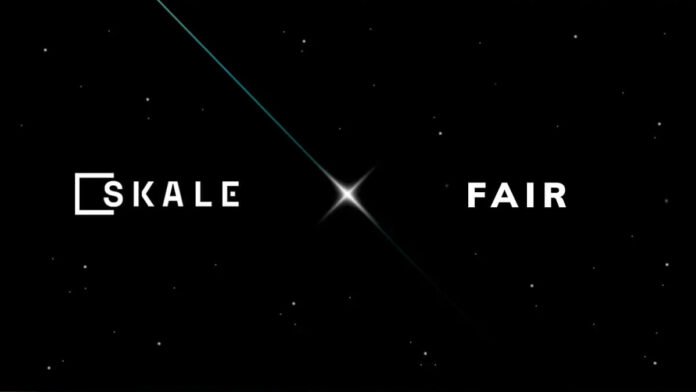SKALE Labs, the team behind the gas-free SKALE Network, has announced the launch of FAIR, a groundbreaking Layer-1 blockchain designed to be the first MEV-resistant chain purpose-built for the coming wave of autonomous AI agents in decentralized finance. The launch positions FAIR at the intersection of AI, DeFi, and blockchain infrastructure, tackling one of the most entrenched and controversial issues in the crypto ecosystem—miner/maximal extractable value (MEV)—at the consensus level.
FAIR, which stands for Fair AI Resilient, is launching with Vodafone’s Pairpoint division as a founding validator, signaling enterprise-level interest in MEV-resilient infrastructure amid the ongoing convergence of cellular networks, AI agents, and decentralized protocols.
“MEV has an expiration date,” said SKALE Labs CEO and Co-Founder Jack O’Holleran. “Blockchains that don’t solve for MEV will someday be obsolete. FAIR embeds encryption into consensus, enabling AI agents to operate securely without being exploited by front-runners or sandwich bots.”
A Blockchain for the AI Era
With forecasts by Bernstein analysts estimating that AI-driven agents will control over $400 billion in DeFi assets by 2030, the FAIR initiative is arriving at a pivotal moment. Today’s decentralized financial infrastructure is not built for the type of real-time, autonomous value transfers that AI agents are expected to power. FAIR aims to provide the trust layer for these systems—ensuring that AI agents can interact with DeFi rails without being gamed by MEV bots.
FAIR introduces several technological innovations to meet this vision:
- BITE Protocol: A new consensus mechanism that eliminates MEV by encrypting transaction order flow, thereby removing the opportunity for front-running or value extraction.
- FAIR EVM: A C++-based, asynchronous virtual machine that offers instant finality, parallel execution, and high throughput for AI-native applications.
- FAIR SDK: A software development kit that enables builders to integrate AI agents into decentralized protocols, execute logic-driven strategies, and access encrypted liquidity.
SKALE will retain a dual-token model for the two ecosystems. While $SKL will remain the core asset across SKALE Chains, FAIR will introduce its own native token with burn and utility mechanics that link both ecosystems, aligning incentives between developers, users, and validators.
Vodafone: Enterprise Validator for the Autonomous Web
The inclusion of Vodafone’s Pairpoint platform as a founding validator adds a layer of credibility and institutional gravitas to the launch. David Palmer, Chief Product Officer at Pairpoint, emphasized the growing importance of security and fairness in an increasingly automated digital economy.
“AI, cellular networks, and Web3 are converging,” said Palmer. “MEV attacks represent a serious risk to trust automation. FAIR is building the kind of infrastructure we need for devices and autonomous agents to transact transparently and securely.”
Vodafone has been active in blockchain experimentation since 2022, exploring identity and IoT integration through its Pairpoint initiative. Its role as a validator on FAIR suggests a future where telco-grade infrastructure supports AI-to-AI microtransactions, supply chain automation, and IoT marketplaces.
Turning SKALE into FAIR
FAIR’s architecture is not siloed—it’s designed to upgrade the entire SKALE ecosystem. All SKALE Chains will eventually be able to adopt the FAIR SDK, making MEV-resistance and AI-native functionality universal across both networks. This creates a unified infrastructure where gaming, DeFi, and AI-based dApps coexist securely.
SKALE, which currently supports over 55 million unique active wallets and has saved users over $12 billion in gas fees, has already built a reputation as a gas-free network ideal for high-throughput use cases like gaming and social apps. With FAIR, it expands into the next frontier: intelligent, autonomous finance.
Why MEV Matters More in an AI World?
MEV—the practice of miners or validators reordering, inserting, or censoring transactions to extract profit—has plagued Ethereum and other blockchains for years. While protocols like Flashbots have tried to mitigate it with off-chain solutions, FAIR is embedding the fix directly into the protocol layer.
In a world where AI agents interact with smart contracts millions of times a second, MEV becomes more than a financial inconvenience—it becomes an existential bottleneck to automated value creation.
By solving this problem at the core, SKALE Labs hopes FAIR will become the AI-native settlement layer for the decentralized internet.
The launch of FAIR reflects a broader trend: the convergence of AI, blockchain, and real-world automation. From OpenAI’s autonomous agent frameworks to IBM’s work on decentralized supply chain bots, FAIR steps in as the missing piece of trust infrastructure for these agents.
While many AI x blockchain projects focus on model marketplaces or decentralized training, FAIR is unique in targeting value execution—an area where transparency, latency, and fairness are paramount. And by prioritizing consensus-level privacy and security, SKALE Labs is tackling problems that will only grow as on-chain AI adoption scales.
The FAIR mainnet is expected to launch later this year, with developer onboarding through the FAIR SDK already underway. The project also plans to roll out partnerships with additional validators, DeFi protocols, and AI projects in Q3.
The team has not disclosed the launch date or tokenomics for the FAIR native token but confirmed that a substantial allocation will go to SKALE community members and $SKL holders.
Read Also: Silobreaker AI Summarisation Tools to Boost Threat Intelligence Workflows




